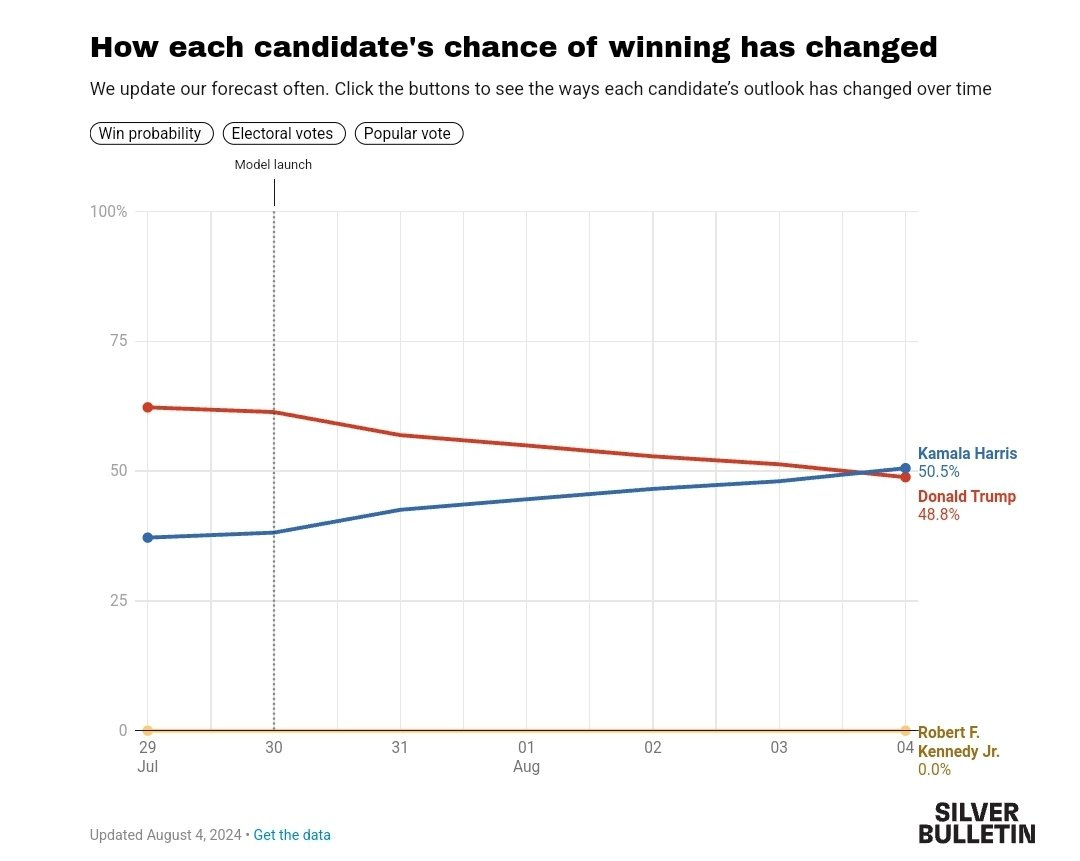Harris’ first big decision
The VP mulls her No. 2 amid a transformed campaign.
Allow me to illustrate the changed state of the race with two memos, issued by competing campaigns five weeks apart.
We’ll start with an excerpt from a June 29 campaign update by Jen O’Malley Dillon, who was then chairing President Joe Biden’s re-election campaign (this was two days after the Atlanta debate):
Now, look at how the Trump campaign introduced a memo to reporters released this weekend:
Here’s a cardinal rule of politics for you: if you’re denying the polls, you’re losing.
And just as the Biden folks rushed to blame an “overblown media narrative” when their polling cratered after the debate, the Trump team’s attempt to unskew the polls now reeks of the same desperation and fear that the race has gotten away from them.
Indeed, Trump’s lead has evaporated in the RealClearPolitics and FiveThirtyEight national polling averages, replaced by a slight Harris edge. According to VoteHub, the polling averages in Arizona, Georgia, and Michigan still show Trump ahead, but two of the key states — Wisconsin and Pennsylvania — have tipped to slim Harris advantages.
Nate Silver’s election model — which was quite bearish on Biden before his exit — now firmly shows a tossup race, with Harris’ odds of victory surpassing Trump’s for the first time this weekend. “The streams have crossed,” the prominent forecaster wrote on X.
Meanwhile, Harris is raking in money — she raised $310 million in July, more than double Trump’s $137 million haul — and bringing in top Democratic talent. Some of former President Barack Obama’s closest advisers, including his 2008 campaign manager David Plouffe, were added to Harris’ staff on Friday. Gene Sperling, who has served as a top economic adviser to the last three Democratic presidents, left the White House to join Team Harris this morning.
That’s the context in which Harris’ running mate — set to be unveiled in the next 24 hours — will join the Democratic ticket.1
Harris has spent the weekend holed up at the Naval Observatory, the vice presidential residence, flanked by former Attorney General Eric Holder, who is overseeing the vetting process for her No. 2. The top three candidates for the post — Arizona Sen. Mark Kelly, Pennsylvania Gov. Josh Shapiro, and Minnesota Gov. Tim Walz — all traveled to Harris’ home this weekend for in-person interviews.
Let’s quickly run through the pros and cons of each contender. Starting with Kelly:
Pros: Of the three most likely picks, Kelly boasts the most dazzling biography: naval aviator during the Gold War, four trips into space as a NASA astronaut, husband of Gabby Giffords (who survived an assassination attempt as a congresswoman), and now senator from a battleground state. His roots in border state Arizona, where he has been a critic of the Biden administrations immigration policies, would also help Harris address one of her biggest liabilities.
Cons: He is seen as the least charismatic of the three possibilities, a fairly new politician who doesn’t always seem comfortable in front of large crowds. He has also butted heads with labor unions, a key Democratic constituency, and — if Harris wins — he would leave a prime Senate open in a highly competitive state.
And now Shapiro:
Pros: The popular governor of perhaps the most important swing state, Shapiro brings the most obvious electoral upside with him to the ticket. And when I say “popular,” I mean it: Shapiro — known for his smooth speaking style — boasts an approval rating in the 60s, even in politically divided Pennsylvania. Harris likely needs Pennsylvania’s 19 electoral votes to win, and while adding Shapiro as her No. 2 certainly wouldn’t guarantee winning them — even if he makes a Pennsylvania victory a shade more likely, it could be worth it for the vice president.
Cons: Shapiro has emerged as the least favorite candidate of the left-most faction of the Democratic coalition. In addition to his support for school vouchers, Shapiro has attracted controversy over his pro-Israel stance and criticism of pro-Palestinian protesters. Over the weekend, a college easy of Shapiro’s was unearthed, in which he wrote that Palestinians were “too battle-minded” to make peace with Israel. Shapiro quickly disavowed the decades-old writing, but it was a sign of the furor that might come from the left if he’s selected.
And finally, Walz:
Pros: A seasoned communicator with an extensive record of progressive accomplishments, Walz has already made an impact on Democratic messaging this cycle: his idea to label Republicans as “weird” has been quickly adopted by Harris herself. Walz is the favorite of the left, who believe the gun-toting Midwestern former high school football coach makes for an ideal messenger for progressive values.
Cons: His progressive position-taking has come at a cost. While Shapiro and Kelly both ran ahead of Biden in their most recent campaigns, Walz ran slightly behind Biden. If he’s under-performed even in his home state, it’s not clear that he could help Harris in even more competitive territory. While he would help coalesce the Democratic base, he would offer little assistance with arguably Harris’ biggest vulnerability: the fact that most swing voters view her as too liberal for the presidency.
In essence, Shapiro brings the biggest upside — and biggest potential downside. Walz is who you pick if you’re worried about keeping the base together. Kelly is the pick who would signal Harris’ attempt to expand the map, pushing the focus of the race from the “Blue Wall” to the Sun Belt.
The decision could come at any moment between today and tomorrow, with Harris set to appear with the VP pick at their first joint rally in Pennsylvania on Tuesday.
In the meantime, the political world is plenty jittery waiting for the announcement to come. Kelly issued a tweet Sunday writing that his “mission is serving Arizonans,” before deleting the missive and replacing it with a tweet that said, “I’ve learned that when your country asks you to serve, you always answer the call.”
Speculation mounted about what the hidden meaning could be, until Kelly’s spokesperson Jacob Peters wrote a tweet of his own: “An Arizona senator tweeting about being an Arizona senator is not news! Go back to your Sundays everybody!”
And so we wait…
More news to know
NBC: American recession fears spark huge Japan sell-off, point to lower U.S. open
CNN: RFK Jr. says he placed a dead bear cub in Central Park 10 years ago
WaPo: Secretaries of state urge Musk to fix AI chatbot spreading false election info
Politico: Trump anointed Vance as MAGA crown prince — but DeSantis isn’t going away
The day ahead
Biden: The president will speak with King Abdullah II of Jordan from his home in Delaware. He will then return to the White House, where he will meet with his national security team in the Situation Room to discuss developments in the Middle East.
Harris: The VP will join the Situation Room meeting, in addition to holding other “internal meetings with staff.”
Congress: The House and Senate are on recess.
Trump/Vance: Neither member of the GOP ticket has any public events today.
Although Harris’ team — like Biden’s and Trump’s before her — should also pick a running mate remembering that things can change on a dime. Even if it seems like she’s gaining momentum now, that won’t necessarily last forever. In particular, two potential crises — economic warning signs and a brewing war in the Middle East — threaten to shake up the 2024 race yet again.







The paragraph after the pros and cons for each candidate very nicely summed up what each would bring and the direction the campaign is likely to take. Nice reporting, and succinct.
How does the 12th amendment come into play if House Republicans challenge a Harris win???